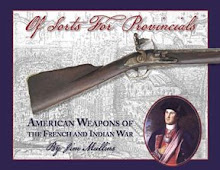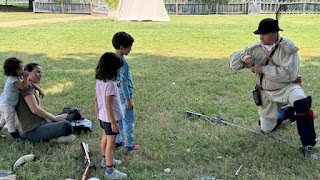"...We according marched, we marched to the waters of New River to Drapers Meadows at Col. Billy Prestons..."
Pension Application of Robert Bleakley (Blakeley) W279
Transcribed and annotated by C. Leon Harris
The encampment will be centered around a Composite/Model Company scenario, portraying a volunteer company of Virginians in August 1774 on the spot where they originally encamped at William Preston's home prior to marching to battle at Point Pleasant.
Participation is juried, and by invitation only. Emphasis will be on quality, not quantity, and participants will be doing some interpretation, drill and demonstrations for the general public during daytime hours (reading Glenn Williams' book on Dunmore's War is highly recommended). Female impressions should be centered around sewing hunting shirts/grain bags for the group during public hours.
When: The Weekend of August 31st, 2024. Friday (8/30) night arrivals, Sunday morning departures (no public programming on Sunday).
Where: Historic Smithfield, Blacksburg Virginia.
Wear: Civilian clothes with the majority of participants in unbleached linen "Osnabrigs" hunting shirts and blue woolen "Indian leggings". See below.
The Volunteer companies from western Virginia mustered in their civilian clothing and for the most part brough their personal arms and equipment. Some of the westernmost companies under Lewis appear to have purchased unbleached osnabrig linen hunting shirts and blue woolen Indian leggins, as well as other minor necessaries such as clasp knives and printed handkerchiefs from local stores.
Rifled arms were preferred, but shortages of rifled arms meant that some men were armed with smoothbores. The portion of the army under Dunmore received 300 stands of arms and accoutrements (bayonets and cartridge boxes) from the magazine in Williamsburg, the western companies appear to have utilized shot bags and horns exclusively.
Tomahawks or small hatchets appear to have been common sidearms.
Participants will be expected to encamp in reproduction tents (or sleep outside under the stars) with minimal camp equipment.
Civilian clothes, Eighteenth century men commonly wore a coat, waistcoat and breeches of linen, wool, cotton, silk or a blended fabric, as well as a linen or cotton shirt, black felt hat, and wool or linen stockings, buckled shoes and a stock or handkerchief around their neck.
A full civilian suit of appropriate cut and fabrics with the addition of an unbleached linen hunting shirt (caped, fringed and open before) and blue woolen Indian leggings are preferred (numerous instances of 1.25 to 2 yards of "coating" or "blue cloth" were purchased for this purpose). Sleeved waistcoats and linen trousers are acceptable substitutions.
Pre 1774 American rifle (barrel 36 inches or more) with a wooden or 2 piece brass box. Kibler "Colonial American" or "Woodsrunner" kits are recommended for the novice.
Pre 1774 British military musket, fowling piece, Dutch musket, or Indian trading/Carolina gun, or an American composite gun featuring parts of the above.
Accoutrements:
Plain, small leather shot bag (around 7 inches square with flap and shoulder strap)
Powderhorn in good repair/well sealed (large 1 pound or so capacity)
Powder measure of tin, horn or antler
Pre 1774 style hatchet, tomahawk or small axe with leather cover for the blade.
Blanket- white woolen with red, blue or black stripes, recommended to be carried with a hoppus or blanket strap.
Canteen- staved wood, tin, or a glass bottle for water
Market wallet for small necessaries and rations
Documentation:
Pension Application of Robert Bleakley (Blakeley) W279
Transcribed and annotated by C. Leon Harris
[Capitalization and punctuation partly corrected]
State of Kentucky } Sct
Wayne County }
On this 24 day of September 1832 personally appeared in Open Court before the County Court th
of the County court of Wayne and State of Kentucky Robert Blakely a Resident of Wayne County
and State of Kentucky aged seventy four years or seventy five years old on the 12 day of th
January 1833, who Being first duly Sworn, according to law, doth on his oath make the following
Declaration in order to obtain the Benefit of the act of Congress passed June 7 1832 th
That he entered the service of the United States under the following named officers and served
as first Sirgent as herein stated.
My first service was in the latter part of September 1773 I enlisted with Capt. John Floyd
as a volunteer for 18 months to go to the opost [outpost?] on or near the Ohio. Col. Charles
Lewis was Col and Andrew Lewis Chief Commander of the Expedition, & I then lived in Henry
county Virginia [formed from Pittsylvania County in 1777] on Black Watter [Blackwater River, in
Franklin County since 1786]. We according marched, we marched to the waters of New River to
Drapers Meadows at Col. Billy Prestons [William Preston’s plantation at present Blacksburg] we
then marched down new River to the mouth of the Cannawwa [sic: Kanawha River at Point
Pleasant] and on the 10 day of October 1774 we had a severe battle under Andrew Lewis our th
chief commander and other officers, with the Shawnee Indians. 86 of our men was killed in the
battle & many wounded. Charles Lewis was mortally wounded Col. William Flemming [sic:
William Fleming] of Roan Oak [sic: Roanoke River near Big Lick, now Roanoke VA] was our
Doctor or Surgeon. on the next day the Indians sent in a flag & Govenor Dunmore came up with
about 2000 more officers & soldiers, and the Indian agreed to capitulate and gave 5 Indians as
Hostages, to be sent to this Opost, untill a final Treaty.
[Capt. William Russell to Col. William Preston. 3QQ78- undated believed to be August 1774]
Dr. Colo. I have long expected to have been releived, by Men at our Forts, that the Volunteers might March, to the appointed place of Rendezvous: such relief was promised the Men when they Engaged and such they must have; other ways are ready, only some brown Linen which Mr. Brander told me,
should be up before the Army Marched from Rendezvous..."
Capt Wm Russell to Col. William Preston
August 28th, 1774
"Dr. Colo. I have got as fare as Mr. Branders with a handful of Men out of my own Company. I think our Number of private Men is thirty one....the Men I have, are fit for the business, but are badly fix'd, for want of Hunting shirts, and Blankets; but as I hear Mr. Branders Waggon,
is on this side New River; I hope we shall get supply'd...I shall be glad Sir., if it can be done, to have a Gun provided against we come down, as I have a very good Hand without: when I was in the service before, there was near twenty press'd Guns: which the Country freely pay'd for,
and I doubt not, but the same necessity will be allowed now..."
To 1¼ yds blue Cloth for leggons….@6……...…..- 7 - 6
47 Capt Harrod & [per] Cowen
...To Jno Cloys wife for making Hunting Shirts...1/2/6
Miss Sally Kincaid for making 10 shirts 1/10/-
To Miss Grills for making 9 do 1/7/-
[Col. William Christian to Col. William Preston. 3QQ89]
Head Of Rich Creek, Septr. 3: 1774
I am informed that Men & provisions were moving from Stanton Wednesday and thursday was a week and that several Compys were at the Warm Springs.
It is also said Mathews dont propose taking out all the flour at once, but to send back the pack horses from the mouth of Elk. That LA. Dunmore wrote to Ch. Lewis
that some of his men had taken some little Towns & killed three or [four] people & that his Lordship was at fort Pitt. The above news came by one of the Woods's.
He says also that there is Jents plenty and all goods necessary for the men such as Shirts Blankets Leggons.
EXTRACT OF A LETTER FROM COLONEL WILLIAM PRESTON, DATED FINCASTLE, SEPTEMBER 28, 1774.
That part of the army under the command of Colonel Lewis, which is to meet Lord Dunmore at the mouth of the Great Kenhawa, or New River, assembled at the Great Levels of
Greenbrier,to the amount of about fifteen hundred rank and file. Colonel Charles Lewis marched with six hundred men on the 6th instant, for the mouth of Elk, a branch
of New River,which empties some distance below the Falls, there to build a small Fort, and prepare canoes. Colonel Andrew Lewis marched with another large party the
12th instant, for the same place; and Colonel Christian was to march yesterday with the remainder, being about four hundred, and the last supply of provisions.
This body of militia being mostly armed with rifle guns, and a great part of them good woodsmen, are looked upon to be at least equal to any troops for the number that
have been raised in America. It is earnestly hoped that they will, in conjunction with the other party, be able to chastise the Ohio Indians for the many murders and
robberies they have committed on our frontiers for many years past...
[Captain John Floyd to Col. William Preston. 33S42, 43.]
Sept. 18th 1774...
I am in hopes we shall make out pretty well about kettles we are also allowed 60 yards of tent cloth for a company...” p. 206-07.
[Col. William Christian to Col. William Preston. 3QQ146.]
“Camp Union Septr. 12, 1774...
The kettles and Tents were chiefly distributed before I came I could get but 16 or 17 battered tin kettles for all Fincastle & but few Tents But I am told oxen brigs [unknown symbol or doodle here] enough for Tents will be brought with the Pack horses to morrow If the major is not marched
when you get this Intelligence I really think we ough[t] to send over the whole Country and try to beg or borrow kettles for to do withougt[sic] is very hard almost [im?]possible
It will presently make men sick to live on Roasted meat without broath.” p. 198.







